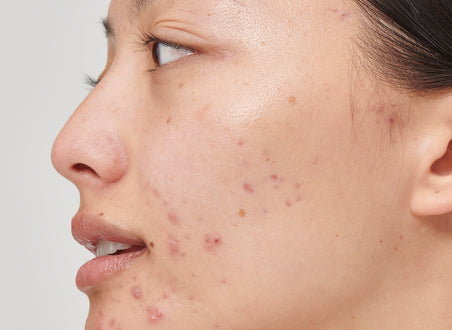What type of acne do I have?

Navigating the world of acne can be a maze of different types and manifestations - from nodules to papules and a variety of comedones in between. To treat effectively, it’s important to know what you’re working with first…
WHAT DOES ACNE LOOK LIKE?
Let’s start at the surface to dissect how the acne breakout has manifested on our skin and where these breakouts sit on the severity scale. Here’s the key forms acne spots and pimples take:
Comedones: hair follicles that have become clogged with oil and dead skin cells.
Blackheads: open comedones at surface, no skin has formed over the plug
Whiteheads: closed comedones at surface with a layer of skin formed over a pus-filled pore.
Papules: Closed comedones, inflamed lumps but no pus.
Pustules: Closed comedones, inflamed and infected with a pus-fileld sack at the surface
Nodules: Deep, hard, painful lumps rooted deep beneath the surface. No pus.
Cysts: Deep, hard, painful lumps rooted deep beneath the surface with a pus-filled sack at the surface.
ACNE TYPES
Beneath the surface we can then identify the type of acne experienced to ensure our active ingredients and routine are targeted efficiently. Acne can be caused by a variety of internal and external factors which require different approaches in their treatment.
Hormonal Acne is common and connected to fluctuations in hormonal activity such as during puberty, pregnancy, menopause but also through stress, diet and lifestyle factors. These internal shifts can trigger excess sebum production which is a core component of breakouts.
Bacterial Acne tends to have varying sizes of spots and is the result of bacteria on the surface becoming enmeshed with oil, dirt and dead skin in the pores. The bacteria stimulates infection and inflammation and is often more severe and aggressive.
Fungal Acne is actually a condition called pityrosporum folliculitis which is an inflammation and infection within the hair follicle which can result in spots forming on the surface.
Cystic Acne is at the inflammatory end of the acne spectrum and forms deeper beneath the skin’s surface. Cystic acne tends to be a more severe extension of hormonal acne in cause.
HOW TO TREAT ACNE
Keeping the skin clean, hydrated and using targeted treatments are the best ways to prevent outbreaks of acne as well as reducing their symptoms when they do appear.
CLEANSE
Salicylic Acid Cleanser: Salicylic Acid is a staple ingredient for keeping pores clear and debris-free. Hyaluronic Acid Cleanser: With dehydrated skin a cause of acne this cleanser can offer a welcome boost for thirsty skin.
TARGET & TREAT
Succinic Acid Treatment: When a breakout is full swing, our targeted treatment clears blemishes fast, reduces inflammation and prevents further clogged pores.
Niacinamide Serum: Keep oil production in balance to prevent outbreaks occurring.
Beta Hydroxy Acid Serum: Unclog pores, target blackheads and reduce excess oil with this hero active.
C-50 Blemish Night Treatment: An overnight gel treatment targets breakouts, unclogs pores and reduces the appearance of redness
MOISTURISE & HYDRATE
Hyaluronic Acid Serum: Keep skin hydrated beneath the surface to prevent oil over-production.
Omega Water Cream: A lightweight gel moisturiser that hydrates without clogging the skin’s surface.
For more information on acne and advice on treatment, contact us at askINKEY or consult a doctor or dermatologist.







